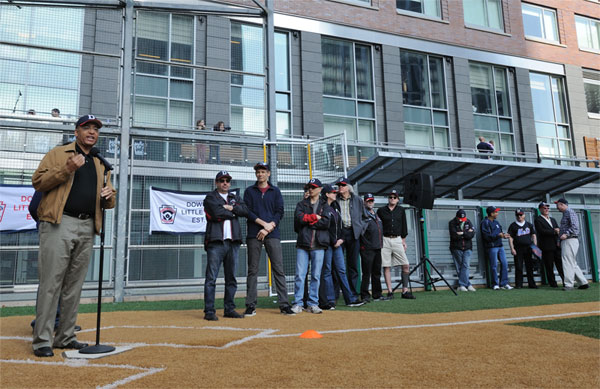
BY TERESE LOEB KREUZER | Gone but not forgotten by Battery Park City residents, Bill Thompson, now running for mayor of New York City, served as chairperson of the Battery Park City Authority between March 2010 and May 2012 when he resigned to work on his mayoral campaign.
His 26 months in Battery Park City gave residents a chance to know him better than most other New Yorkers, with their views of him ranging from harsh to non-committal.
Several neighborhood activists were asked to assess Thompson’s mayoral candidacy from their perspective of his performance as B.P.C.A. chairperson.
“Although I’ve lived in Battery Park City and have been an active member of the community throughout Thompson’s tenure as chair, I cannot cite a single accomplishment of his,” said George Calderaro, vice chairperson of Community Board 1’s Battery Park City committee. “What I do know is that he brought in political and campaign cronies and fired one-third of the Battery Park City Authority’s staff, including the agency’s only licensed architect and engineer.”
Calderaro said this helped send the remaining construction projects “off the rails.”
On Nov. 9, 2011, 19 B.P.C.A. employees were fired around the time that the Asphalt Green Battery Park City community center at 211 North End Ave. was initially supposed to open. A year later, on Oct. 29, 2012, Superstorm Sandy flooded the community center, but even before that happened, construction delays, permitting issues and contractual problems between the B.P.C.A. and Asphalt Green had kept the community center from opening. At the present time, the opening date is unknown.
Pier A at the southern end of Battery Park City is another large construction project under the B.P.C.A.’s jurisdiction. It is being renovated by the authority with $30 million allocated by the city’s Economic Development Corp., but is now $6 million over budget and well over a year behind schedule. The historic pier, which dates from 1886, was on budget and on schedule at the time of the layoffs.
Thompson, the city’s former comptroller, was appointed by former Gov. David Paterson. He made the cuts during a time when there were increasing calls from City Hall and Albany to scale back or even disband the authority because the riverside neighborhood is almost completely developed.
Resident Susan J. Bridges said “his lack of communication with the neighborhood – despite B.P.C.A.’s dependence on it to provide funds – suggests that he would not be open to listening to the various communities and other constituencies that create the city. I will be watching any Thompson campaign for evidence of these attitudes expressing themselves.”
John Dellaportas, another long-time resident of Battery Park City, was less critical of Thompson than of the authority in general.
“The [B.P.C.A. chairman] has no function other than as a lawful means to steer public funds to friends of the governor,” he said. “So Mr. Thompson’s tenure…wouldn’t tell me much about the kind of mayor he might be. For all I know, he could be great, or he could be terrible. He seems like a decent enough fellow, but it’s a tough job.”
Liz McCabe, who worked with others to try and get the Asphalt Green community center open, said she had voted for Thompson when he ran for mayor in 2009 but would not vote for him again based on what she had learned about him over the last six months.
“He was chairman during the stalling of Asphalt Green,” she said.
She also mentioned that shortly after Thompson’s departure as B.P.C.A. chairperson, Gayle Horwitz, president of the authority and a close colleague of Thompson’s, hired Randy Mastro — the biggest fundraiser for Thompson’s mayoral campaign — to start legal action against Asphalt Green. McCabe called Thompson’s actions “corrupt.”
However, Mark Costello, former president of the Downtown Little League, lauded Thompson for finishing the ballfields’ conversion from grass to artificial turf, also adding “he is a very nice guy.”
The Thompson campaign did not respond to a request for comment for this article.
At the time of his resignation, Thompson himself assessed his years in Battery Park City. He mentioned the installation of artificial turf on the B.P.C. ball fields, the repaving of Murray St. and the restoration of South Cove among his accomplishments. He also cited the long-awaited community center featuring two swimming pools and gym on North End Ave., in addition to the “transformational” renovation of Pier A.
“I’m very comfortable that these projects are moving forward…quickly and that everybody will be very pleased when they’re done,” he said at the time.
According to a Quinnipiac University poll conducted in mid-January, if the Democratic primary for mayor were held now, Thompson would lose to City Council Speaker Christine Quinn among registered Democratic voters, 35 percent to 10 — but both candidates would handily beat the presumed Republican front runner, Joseph Lhota.


































